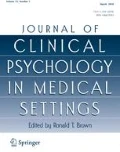Abstract
Clinical reports suggest that fatigue is a common and disruptive long-term side effect of radiotherapy; however, there has been little systematic attention given to this phenomenon. The primary aim of this study was to assess fatigue its impact on quality of life in women who had completed radiotherapy for breast cancer. A key feature of this study was the inclusion of a comparison group of women of similar age with no history of cancer. The results indicated that the fatigue experienced by women after radiotherapy for breast cancer was not significantly different in intensity, duration, or disruptiveness from fatigue experienced by healthy women. In addition, radiotherapy recipients reported a quality of life similar to that of the healthy women. For both groups of women greater fatigue was related to a poorer quality of life. These findings suggest that following radiotherapy for breast cancer, women can expect to experience fatigue which is not worse than what they might “normally” experience. This information may be a useful part of psychoeducational interventions designed for women scheduled to begin radiotherapy for breast cancer.
Similar content being viewed by others
REFERENCES
Berglund, G., Bolund, C., Fornander, T., & Sjoden, P. (1991). Late effects of adjuvant chemotherapy and postoperative radiotherapy on quality of life among breast cancer patients. European Journal of Cancer, 27, 1075-1081.
Bergner, M., Bonnitt, R. A., Carter, W. B. & Gilson, B. S. (1981). The Sickness Impact Profile: Development and final revision of a health status measure. Medical Care, 19, 787-805.
Christensen, T., Bendix, T., & Kehlet, H. (1982). Fatigue and cardiorespiratory function following abdominal surgery. British Journal of Surgery, 69, 417-419.
Graydon, J. (1994). Women with breast cancer: Their quality of life following a course of radiation therapy. Journal of Advanced Nursing, 19, 617-622.
Greenberg, D. B., Sawicka, J., Eisenthal, S., & Ross, D. (1992). Fatigue syndrome due to localized radiation. Journal of Pain and Symptom Management, 7, 38-45.
Hann, D. M., Jacobsen, P. J., Martin, S. C., Kronish, L., Azzarello, L. M., & Fields, K. K. (1997a). Quality of life following bone marrow transplantation for breast cancer: A comparative study. Bone Marrow Transplantation, 19, 257-264.
Hann, D. M., Jacobsen, P. J., Martin, S. C., Kronish, L., Azzarello, L. M., & Fields, K. K. (1997b). Fatigue in women treated with BMT for breast cancer: A comparison with women with no history of cancer. Supportive Care in Cancer, 5, 44-52.
Hann, D. M., Jacobsen, P. J., Azzarello, L. M., Martin, S. C., Fields, K., Lyman, G., & Greenberg, H. (1997c). Measurement of fatigue in cancer patients: Development and validation of the Fatigue Symptom Inventory, Quality of Life Research (in press).
McNair, D. M., Lorr, M., & Droppleman, L. F. (1981). The manual for the Profile of Mood States. San Diego, CA: Educational and Industrial Testing Service.
Pearson, P. G., & Byars, G. E. (1956). The development and validation of a check list measuring subjective fatigue (Report No. 56–115). Randolph AFB, School of Aviation, United States Air Force.
Portenoy, R. K., Thaler, H. T., & Kornblith, A. B. (1994). The Memorial Symptom Assessment Scale: An instrument for the evaluation of symptom prevalence, characteristics, and distress. European Journal of Cancer, 30A, 1326-1336.
Radloff, L. S. (1977). The CES-D Scale: A self-report depression scale for research in the general population. Applied Psychological Measurement, 1(3), 385-401.
Smets, E., Garssen, B., Schuster-Uitterhoeve, A., & deHaes, J. (1993). Fatigue in cancer patients. British Journal of Cancer, 68, 220-224.
Spielberger, C. D., Gorsuch, R. L., & Lushene, R. D. (1970). STAI: Manual for the State-Trait Anxiety Inventory. Palo Alto, CA: Consulting Psychologists Press.
Ware, J. E., Kosinski, M., & Keller, S. D. (1991). SF-36 Physical and Mental Health Summary Scales: A user's manual. Boston, MA: New England Medical Center.
Ware, J. E., Snow, K. K., Kosinski, M., & Gandek, B. (1993). SF-36 Health Survey: Manual and interpretation guide. Boston, MA: New England Medical Center.
Ware, J. E., Kosinski, M., & Keller, S. D. (1994). SF-36 Physical and Mental Health Summary Scales: A user's manual. Boston, MA: New England Medical Center.
Winningham, M. L., Nail, L. M., Burke, M. B., Brophy, L., Cimprich, B., Jones, L. S., Pickard-Holley, S., Rhodes, V., St. Pierre, B., Beck, S., Glass, E. C., Mock, V. L., Mooney, K. H., & Piper, B. (1994). Fatigue and the cancer experience: The state of the knowledge. Oncology Nursing Forum, 21(1), 23-36.
Author information
Authors and Affiliations
Rights and permissions
About this article
Cite this article
Hann, D.M., Jacobsen, P., Martin, S. et al. Fatigue and Quality of Life Following Radiotherapy for Breast Cancer: A Comparative Study. Journal of Clinical Psychology in Medical Settings 5, 19–33 (1998). https://doi.org/10.1023/A:1026249702250
Issue Date:
DOI: https://doi.org/10.1023/A:1026249702250



